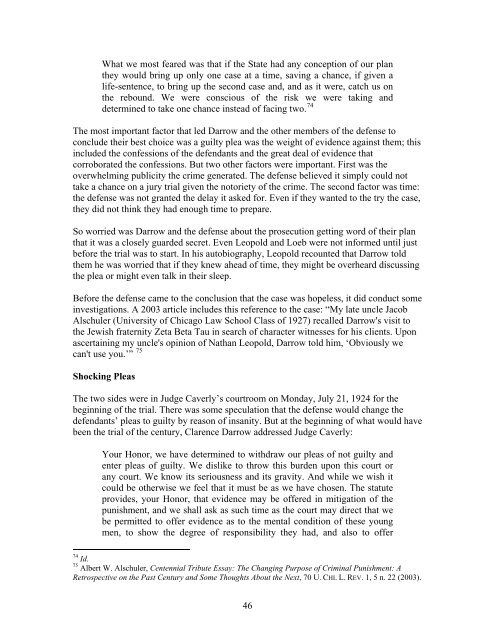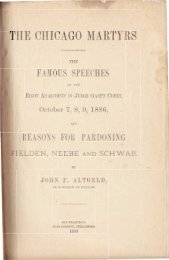Leopold and Loeb Trial - The Clarence Darrow Collection
Leopold and Loeb Trial - The Clarence Darrow Collection
Leopold and Loeb Trial - The Clarence Darrow Collection
You also want an ePaper? Increase the reach of your titles
YUMPU automatically turns print PDFs into web optimized ePapers that Google loves.
What we most feared was that if the State had any conception of our plan<br />
they would bring up only one case at a time, saving a chance, if given a<br />
life-sentence, to bring up the second case <strong>and</strong>, <strong>and</strong> as it were, catch us on<br />
the rebound. We were conscious of the risk we were taking <strong>and</strong><br />
determined to take one chance instead of facing two. 74<br />
<strong>The</strong> most important factor that led <strong>Darrow</strong> <strong>and</strong> the other members of the defense to<br />
conclude their best choice was a guilty plea was the weight of evidence against them; this<br />
included the confessions of the defendants <strong>and</strong> the great deal of evidence that<br />
corroborated the confessions. But two other factors were important. First was the<br />
overwhelming publicity the crime generated. <strong>The</strong> defense believed it simply could not<br />
take a chance on a jury trial given the notoriety of the crime. <strong>The</strong> second factor was time:<br />
the defense was not granted the delay it asked for. Even if they wanted to the try the case,<br />
they did not think they had enough time to prepare.<br />
So worried was <strong>Darrow</strong> <strong>and</strong> the defense about the prosecution getting word of their plan<br />
that it was a closely guarded secret. Even <strong>Leopold</strong> <strong>and</strong> <strong>Loeb</strong> were not informed until just<br />
before the trial was to start. In his autobiography, <strong>Leopold</strong> recounted that <strong>Darrow</strong> told<br />
them he was worried that if they knew ahead of time, they might be overheard discussing<br />
the plea or might even talk in their sleep.<br />
Before the defense came to the conclusion that the case was hopeless, it did conduct some<br />
investigations. A 2003 article includes this reference to the case: “My late uncle Jacob<br />
Alschuler (University of Chicago Law School Class of 1927) recalled <strong>Darrow</strong>'s visit to<br />
the Jewish fraternity Zeta Beta Tau in search of character witnesses for his clients. Upon<br />
ascertaining my uncle's opinion of Nathan <strong>Leopold</strong>, <strong>Darrow</strong> told him, ‘Obviously we<br />
can't use you.’” 75<br />
Shocking Pleas<br />
<strong>The</strong> two sides were in Judge Caverly’s courtroom on Monday, July 21, 1924 for the<br />
beginning of the trial. <strong>The</strong>re was some speculation that the defense would change the<br />
defendants’ pleas to guilty by reason of insanity. But at the beginning of what would have<br />
been the trial of the century, <strong>Clarence</strong> <strong>Darrow</strong> addressed Judge Caverly:<br />
Your Honor, we have determined to withdraw our pleas of not guilty <strong>and</strong><br />
enter pleas of guilty. We dislike to throw this burden upon this court or<br />
any court. We know its seriousness <strong>and</strong> its gravity. And while we wish it<br />
could be otherwise we feel that it must be as we have chosen. <strong>The</strong> statute<br />
provides, your Honor, that evidence may be offered in mitigation of the<br />
punishment, <strong>and</strong> we shall ask as such time as the court may direct that we<br />
be permitted to offer evidence as to the mental condition of these young<br />
men, to show the degree of responsibility they had, <strong>and</strong> also to offer<br />
74 Id.<br />
75 Albert W. Alschuler, Centennial Tribute Essay: <strong>The</strong> Changing Purpose of Criminal Punishment: A<br />
Retrospective on the Past Century <strong>and</strong> Some Thoughts About the Next, 70 U. CHI. L. REV. 1, 5 n. 22 (2003).<br />
46

















